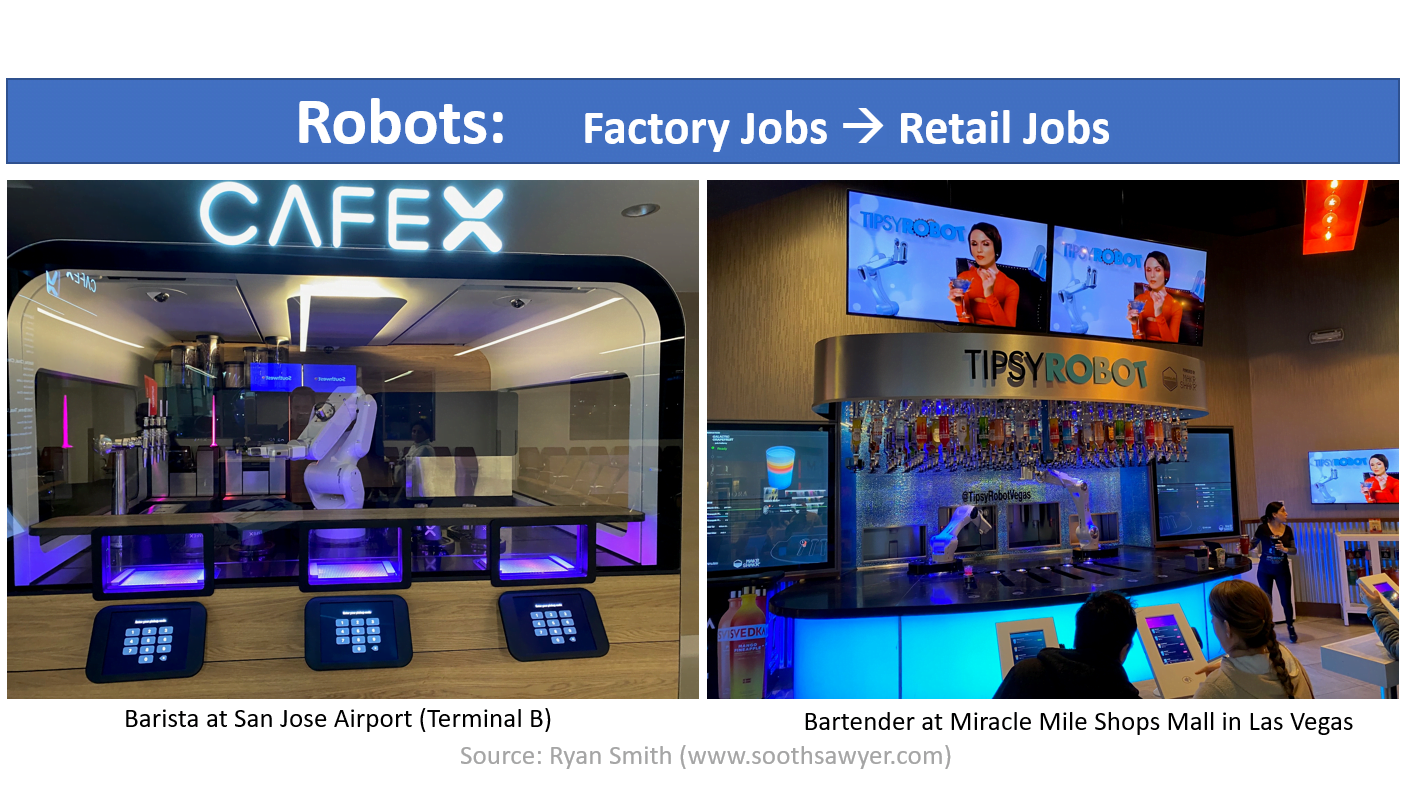On a recent trip to Las Vegas, I encountered a few robots. No, it was not street performers and no it wasn’t a comic convention. 🙂
You know, I can read about tech taking over jobs all day long.. but when I see two instances of it on one weekend trip, it really got me thinking. Are we about to start seeing robots more rapidly enter our lives? Are the total costs of deploying robots now at the tipping point of removing more job openings?
These new type of “workers” are quite attractive to retail business owners.
You don’t have to deal with
- Overtime Pay / Laws
- Unions
- Employee-related Complaints
- Employee Days Off
- Employee-related Taxes/Benefits
- HR Issues
- Annual Pay Increases
- Minimum Wage Hikes
- Employee Theft
- Re-training New Employees
- Labor Acquisition Time/Cost
You get additional benefits
- You can depreciate your “worker” yearly
- You can easily measure its productivity
- You require less management oversight; great for small biz owners
- It forces you to know exactly what you want your worker to do in their job; It acts as a forced method of documentation.
Some drawbacks
- It only does as you tell it to; there are no “street smarts” to deal with exceptions or filling in the gaps that workers often do, due to the lack of adequate training
- It doesn’t currently feel as warm as working with people; this may improve over time
- Any change to the process and you have to modify its programming
- Perception of high costs due to its capex vs opex model; Although robot makers can easily offer opex models to retail owners.
Wow, robots are starting to look rather good.
Costs to Deploy
At a recent cocktail party I was at, I was chatting with a restaurant owner and she was telling me about a consultant she had working on programming robots for her business. I don’t recall the exact figure she mentioned spending on the consultant but I believe it was slightly over $100,000 USD. I’m not sure if this is a normal fee but it’s the only data point I have, since I have not researched this topic in detail.
$100K may sound like a lot, but the beauty is that is a one time cost. A one time capital outlay with many years of reaping the benefits. This assumes you don’t have to pay that robotics engineer to come back and tweak things.
Complexity needs to decrease
The key to making things take off like wildfire will be to reduce the complexity of programming them so less skilled labor is required to get robots up and running.
With all these benefits, will 2020 bring more robots into our personal daily lives? And what will be the effect on retail jobs?
Until then, I’ll just have to enjoy my $20 margarita made by a tipsy robot. Wait a [triple] sec .. shouldn’t the cost have come down? Oh well, I guess I’ll have to wait until the novelty wears off. 🙂
What are your thoughts?

I have been around IT since I was in high school (running a customized BBS, and hacking) and am not the typical person that finds one area of interest at work; I have designed databases, automated IT processes, written code at the driver level and all the way up to the GUI level, ran an international software engineering team, started an e-commerce business that generated over $1M, ran a $5B product marketing team for one of the largest semiconductor players in the world, traveled as a sales engineer for the largest storage OEM in the world, researched and developed strategy for one of the top 5 enterprise storage providers, and traveled around the world helping various companies make investment decisions in startups. I also am extremely passionate about uncovering insights from any data set. I just like to have fun by making a notable difference, influencing others, and to work with smart people.

